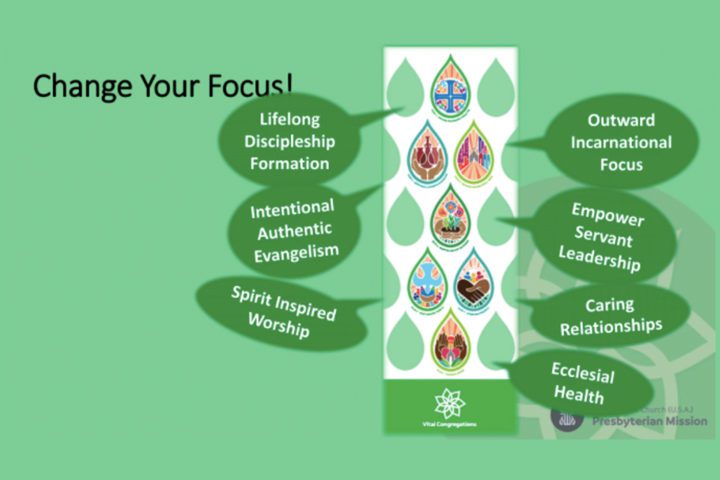During Lent, Rev Rob Stewart offers a 7-part series about the Vital Congregations Initiative entitled “7 Marks of Vital Congregations”. This is the fourth installment, which focuses on outward incarnational focus. It’s offered by Rev Lee Ireland.
John 13:1-5, 12-17
It was just before the Passover Festival. Jesus knew that the hour had come for him to leave this world and go to the Father. Having loved his own who were in the world, he loved them to the end.
2 The evening meal was in progress, and the devil had already prompted Judas, the son of Simon Iscariot, to betray Jesus. 3 Jesus knew that the Father had put all things under his power, and that he had come from God and was returning to God; 4 so he got up from the meal, took off his outer clothing, and wrapped a towel around his waist. 5 After that, he poured water into a basin and began to wash his disciples’ feet, drying them with the towel that was wrapped around him.
12 When he had finished washing their feet, he put on his clothes and returned to his place. “Do you understand what I have done for you?” he asked them. 13 “You call me ‘Teacher’ and ‘Lord,’ and rightly so, for that is what I am. 14 Now that I, your Lord and Teacher, have washed your feet, you also should wash one another’s feet. 15 I have set you an example that you should do as I have done for you. 16 Very truly I tell you, no servant is greater than his master, nor is a messenger greater than the one who sent him. 17 Now that you know these things, you will be blessed if you do them.
Servant Leader. Is this term an oxymoron? Servant and leader. Can you be a servant who is a leader? Probably not easily, if you’re working in the competitive corporate world where the brightest and the best compete to move up the corporate ladder. If you are a Christ-follower, I hope that the term is not an oxymoron, but a way of life, a life-giving way of being.
When I moved from the corporate world to becoming a pastor, I had to change my way of dealing with people. In the corporate world, I had staff whose work I directed. Though I operated in a collaborative mode, I had the final word. At the church I pastored, most of the work was done by volunteers. And many of those folks who volunteered were quite explicit about what they would do or would not do! There was no telling someone what to do. Suggesting yes; but telling, no.
I had read about servant leadership and realized that Jesus was the prime example for me to follow as a pastor. But it took a bit of adjustment to shift gears, so to speak, from corporate leadership to servant leadership.
What exactly is servant leadership? Wikipedia defines it this way: A servant-leader shares power, puts the needs of the employees first and helps people develop and perform as highly as possible. Servant leadership inverts the norm, which puts the customer service associates as the main priority. Instead of the people working to serve the leader, the leader exists to serve the people.
As a new pastor, I soon found out that the only way to lead was to put people first and help them develop and perform as highly as possible. Isn’t that what Jesus did. He trained his disciples so they could carry on after he had left this earth. The Bible says Jesus was continually being asked to heal, to care for the crowds that followed him. Jesus put the people he served first. We only need to read the stories of Jesus’ life in the Bible in Matthew, Mark, Luke, and John to see a servant leader in action.
(Note: Even Jesus took time away from his work to pray and recover. If you’re a church member, please keep this in mind and provide opportunities for your pastor to get away and recover from the demanding work she or he does.)
The contemporary writer who popularized the phrase, ‘servant leader,’ Robert K. Greenleaf, puts it this way: “In simpler terms, servant leaders should seek to be servants first, to care for the needs of all others around them, to ensure the growth of future leaders. These traits indicate one is a servant leader because, overall, they are causing the ones they serve to become healthier and wiser, guiding others toward self-improvement. Eventually, the served are driven to possess the traits of a servant leader as well, continuing the spread of the leadership style.” (Wikipedia)
Does that sound familiar? Isn’t that what discipling people is all about; guiding people’s faith development, enabling others to take the place of the leader when that leader is no longer in that position? We spread the Gospel story and train others to use their gifts so they can take over leading others. And the cycle goes on as it has for thousands of years in the Christian faith.
Another way to look at servant leadership is mentoring. Mentors guide, care, and help their mentees develop skills to succeed. I had one particular mentor who helped me as I began my journey to become a pastor. He advised me on seminary classes to take. He encouraged me to study the Bible. He helped me to understand my spiritual gifts, the gifts that God had given me to use to serve God.
Do you have someone like that in your life now? Have you in the past? Are you serving someone now, helping that individual to develop their faith and the use of their spiritual gifts? I hope so!
Servant means servant, doing the tasks most people don’t want to do. We live in a neighborhood where the folks are older and need assistance cleaning their homes. Every week I see these cleaners carrying buckets and mops into a home. Would you be willing to do this? Or is it beneath you?
What about Jesus? No task was too lowly or beneath him – even to the point of washing the disciples’ feet, a job reserved for the servants in the household.
I have participated in a foot-washing ministry many times. It’s humbling for me to kneel in front of a person and ask them if I may wash their feet. But it’s also somehow humbling to the person whose feet you are washing. Most of us are quite independent and believe we are in control of our lives. We do as much as we can ourselves and hate to ask for help. Having someone wash your feet is an intimate experience. Can you imagine how the disciples felt when their teacher washed their feet? Jesus washing their feet must have been a powerful lesson to all of them.
Let’s look at verse 17 again: 17 Now that you know these things, you will be blessed if you do them. The world needs people who are willing to serve others, people who are willing to roll up their sleeves and get their hands dirty. The church needs people who use their spiritual gifts to help others grow in their faith. As you do these things, you will find you are blessed.
For Christ-followers, servant leader is not an oxymoron. It’s a way of life. It’s following Jesus’ example. Lead on!


